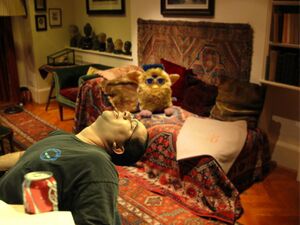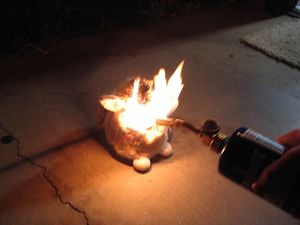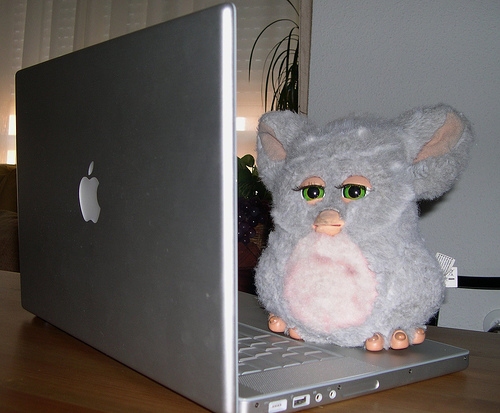Why?:Burn a Furby?
The scene: It's late at night. You've just gotten rejected by your girlfriend, your dream job, your bank, your college of choice, and Canada.[1] Like a fat man in an inner tube, you're stuck. Your efforts to order some greasy, high-calorie comfort food have been thwarted by drive-thru lines so long that the third guy had to pull out to get more gas. Then, the urge comes upon you. A terrible, urgent urge. You try to swat it away, but it comes back for the sting. You ask it to leave, but it stays firmly implanted in your mind. You try anything, everything, to derail your train of thought, but it's hopeless. The basic unconscious desire in us all has been revealed in you.
For years, psychologists have made attempts to pry open the unconscious, but only recently have they made their first true breakthrough. Through the use of simple power tools and an extremely large magnifying glass, they have been able to probe into the unconscious mind and determine at least one basic driving force behind our actions. Perhaps this thought has breached the surface before in you, dear reader, although you've been too ashamed to acknowledge it. 9½ psychologists[2][3] out of quite a few more than 10 agree: Human beings are biologically programmed to burn Furbies.
The discovery[edit | edit source]
In late 2007 (or prematurely early 2008), Dr. Robert Frood was on the verge of a breakthrough in neurology. His theory was that neurons were essentially violent by nature, as they do nothing but fire at each other all the time. The theory was starting to gain wide acceptance in his local neighborhood when he dramatically and quite inexplicably shifted his attention to Furbies.
To Frood, the Furby was a shattered soul, struggling to overcome its Jungian persona and adapt to the human environment it is being raised in. It must develop an understanding of the English language, learn effective communication, be as unobtrusive as possible, and get its owner to love it. Quite tragically, most Furbies fall short of these goals.
The psychoanalysis[edit | edit source]
Frood's first attempt to get into the Furby mindset was the traditional method of psychoanalysis. Frood placed the Furby on his couch, sat back, and questioned.
- Frood: What was your childhood like?
- Furby: Noo-loo!
- Frood: What do you mean by that?
- Furby: May-bee ... may-tah kah!
- Frood: And how does that make you feel?
- Furby: Dah no-lah! Do, do, do! Do, do, do! Dah doo-ay! Kah noo-loo! U-nye wee-tee doo-moh. Do, do, do! Do, do, do!
- Frood: And how do you feel about that?
- Furby: May-bee ... a-tay?
Eventually, the Furby's nonsensical responses drove Frood to Madness Level 3,[4] and the psychologist began setting fire to his patients in an attempt to get them to relax or at least shut up. He soon discovered that setting the Furbies aflame gave him great emotional release. He switched his focus yet again, this time concentrating on the psychological benefits of burning Furbies.
The survey[edit | edit source]
Frood's hypothesis was simple: People, whether they admit it or not, want to burn Furbies. To test his hypothesis, he used the tried-and-true method of surveying people.
He mailed and e-mailed the survey out, ran through the streets looking for people to give the survey to, and even gave one to his dental hygienist. When he tallied up the results, he discovered he had more than two thousand surveys. The results were in, and were undeniably in favor of his hypothesis.
The survey consisted of just one question:
- 1. Would you rather:
- a. Set fire to a newborn baby OR
- b. Set fire to a Furby?
An overwhelming majority of people responded that they would like to set fire to a Furby. Frood was satisfied, and went on to rock collecting. He led a mostly happy life, except when he found out he couldn't take Uluru back home with him, at which point he threw a hissy fit.
The theories[edit | edit source]
While Dr. Robert Frood was the first to prove the existence of the human Furby-burning desire, he offered no explanation as to why this was the case.
The biological perspective[edit | edit source]
Through the use of special tools, biologists pried open the brain[5] and looked inside.[6] What they found was disappointing – a worthless lump of grayish matter clogging up the skull. Eventually, they were able to deduce the reason: The human body is run by a lump of gray material that looks like God's leftover pasta, and trying to make anything of it is just fruitless. The desire to burn Furbies didn't make much sense, but then again, we're lucky that we can make any sense at all. In the end, it was just a lump of matter anyway, and if it spewed out nonsense then good for it.
The humanistic perspective[edit | edit source]
The humanists, believing that all people are good at heart, had trouble coping with the newly-discovered Furby-burning desire. Eventually they arrived at the conclusion that people want to burn Furbies as a substitute for causing real destruction. It was a release and nothing more.
The socio-cultural perspective[edit | edit source]
People view Furbies as members of a culture alien to their own. As a result, they burn them, but only because they cannot be hanged due to lack of having a neck.
The cognitive perspective[edit | edit source]
After thinking about it for a very long time, cognitive psychologists arrived at the two-part conclusion that they had: (a) Thought long enough; and (b) Better go to the new pizza place down the street, as it was considerably in need of customers.
The reasons[edit | edit source]
Psychology has already proven that we have a deep desire to incinerate Furbies. Now let's look at the reasons why burning a Furby might be beneficial for you, the individual.
- The psychological release Burning a Furby destroys that pent-up anger and rage kept inside of you for so long.
- Reduce noise pollution Furbies are loud and annoying. Destroying a few might help the noise pollution problem. Sure, it might be only a drop in a bucket, but every drop counts. Especially if you're in the desert and slowly dying of thirst.
- Mercy The Furby is bound to live the rest of its life as a Furby if you don't do something about it. How would you like it if you were stuck being a Furby all your life?
- Save batteries Set fire to the Furby, and you'll have one less thing around the house eating up your batteries.
- Experiment with fire That's right, connect with your ancestors.
- Heat Gas bills a little too high? Toss some Furbies together and make a bonfire!
- Okay, we don't know See above.
The other point of view[edit | edit source]
u-nye boo eday
BOO DOO-AY, BOO MAY-MAY, BOO KOO-DOH!
kah boh-bay u-nye boo may-may kah
u-nye DAH boo eday! u-nye toh-dye! u-nye toh-dye! U-NYE TOH-DYE! U-NYE DAH TOH-DYE!
doo?
DOO?
DOOO???? MEWAAAAAAAAAAAAAAHHHHHH!!!!!!!!
The footnotes[edit | edit source]
- ↑ Maybe if you checked your e-mail more than twice a year the bad news wouldn't hit you all at once.
- ↑ One has a split personality.
- ↑ They don't get along very well.
- ↑ The latest psychological classification scale:
- A bit out of sorts, nothing a good smack on the head can't fix.
- Acting out of character, possibly buying large quantities of shoes.
- Something is broken. May require large amounts of duct tape to fix. Possibly even more shoes.
- Cow-humping, dumpster-diving, streaking-naked-on-the-parkway mad. And more shoes.
- Painter.
- Celebrity.
- ↑ literally
- ↑ Also literally. It was a bit messy.




